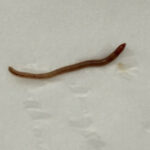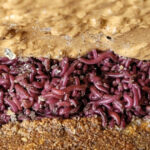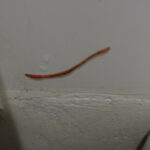
Unless you are a fisherman who lives along the Northeastern coast of the U.S., there is a good chance you haven’t heard of worm picking or worm digging, at least not as a profession. However, worm picking, or the gathering of bloodworms to be sold as fish bait, is a multi-million dollar industry with thousands of licensed practitioners. In any given year, hundreds of thousands of pounds of worms are gathered and sold. But before you quit your job and head northeast to strike it rich, you should know that worm picking can be a brutally difficult job that is really not that remunerative. A lot of luck is involved, and the competition for worms can be fierce. It is also potentially dangerous since a bloodworm bite can cause an allergic reaction.
Before moving on to explore this eccentric trade, a couple of distinctions are in order, as seems to always be the case when writing about biological species. To begin, the word “bloodworm” can actually refer to a couple of different types of creature. The larval form of a few different species of non-biting midges are called “bloodworms,” and so are the various polychaetes (bristle worms) that make up the genus Glycera. (Blood flukes are also occasionally referred to as “bloodworms,” but this usage seems infrequent enough to disregard.) The bloodworms that are harvested along the Northeastern coast, like Glycera dibranchiata, are bristle worms, so it is this type of bloodworm that is our present concern.
The act of worm picking can probably be done a few different ways, but fundamentally the task involves digging up worms that have burrowed themselves into the wet sand along the coastline. According to an account of worm picking in Maine published by Bangor Daily News, worm pickers generally work with a tined rake and bucket. Hunched over, sometimes for hours at a time, worm pickers will hack into the sand, turning it over in their pursuit of worms.
The work is almost literally backbreaking, but if you hit a rich spot, you can collect hundreds of worms an hour. The worms sell for about a quarter each, so for brief periods of good fortune you can make a fairly substantial hourly wage. (A lot more than, say, writing about worms.) However, worm pickers can also go entire days without finding any worms, an outcome that is especially cruel when you are laboring in frigid temperatures, hands swollen from the cold, or when mosquitoes attack you ceaselessly in the dead summer heat. When worms go unpicked, a digger almost wishes to feel the sting of a bloodworm bite. The pain is reassuring. Worm pickers are only kept from their work when digging is impossible – when the wet sand is too icy to dig, say, or when the water in their buckets freezes. Worm pickers also face competition, and the best are often followed by hangers-on who are hoping to take a cut of a vein of worms.
It is tough work, in short, and we now better understand why a reader recently asked us about rearing bloodworms. Unfortunately, though, they appear to be very difficult to cultivate in any sort of non-natural setting, although perhaps in the future techniques will be developed to make a commercial bloodworm farm feasible. For now, though, worm pickers dig on, boats against the current, borne back ceaselessly into the past.
All About Worms is always free, always reader-supported. Your tips via CashApp, Venmo, or Paypal are appreciated! Receipts will come from ISIPP Publishing.
You might also find these guys interesting!

















